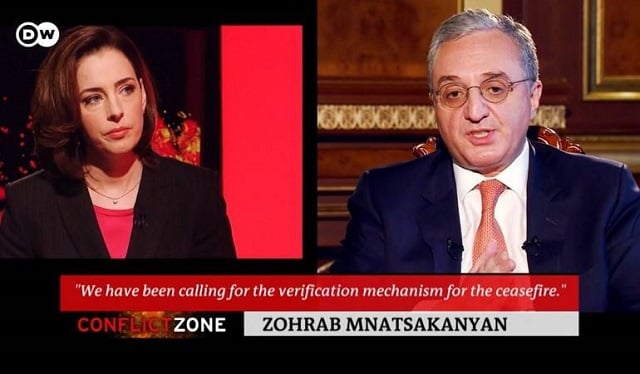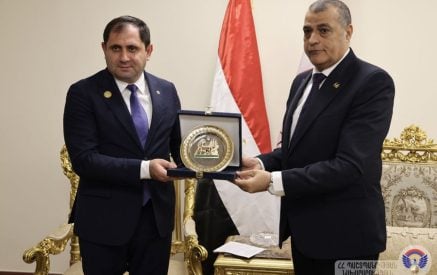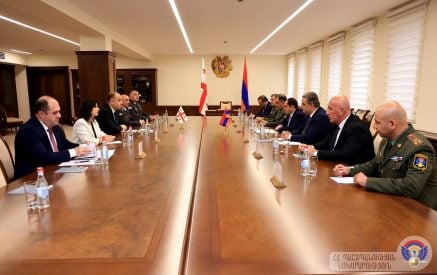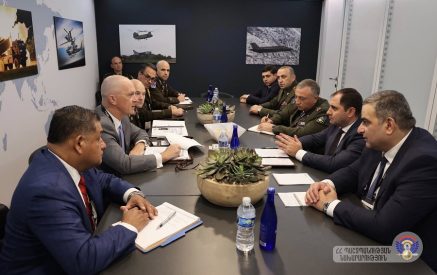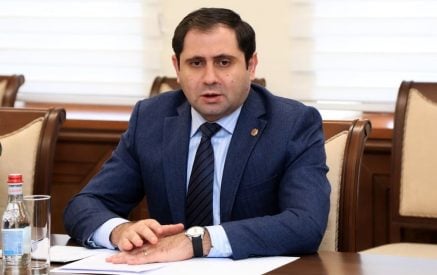Deutsche Welle: There is currently fighting in the disputed region of Nagorno-Karabakh which is governed by ethnic Armenians, but which is recognized as part of Azerbaijan by the international community. Hundreds have already been reported dead. You have been part of talks to broker two ceasefires in that regard. And yet the fighting continues. What responsibility does Armenia and the forces in the region which you back bear for the continued fighting?
Zohrab Mnatsakanyan: We have committed ourselves fully to the two statements: one in Moscow, the joint statement of the 10th of October, and the second one on the 17th of October, committed fully to respect the ceasefire, to go back to the negotiations, and to find a peaceful resolution to this conflict. We have been totally faithful. However, the Azerbaiajni side has chosen the part of war. The two ceasefires have been violated right away after we have reached an agreement, and there has been no calm on the line of contact and throughout the territory where the conflict is taking place. So, we have issued a statement today, in which we have reiterated our full commitment to the agreements that we have reached and expressed in those two statements.
Deutsche Welle: Mr. Foreign Minister, you said that you are committed. But I would like to put it to you, because on Saturday the Azerbaijani side said that 14 people were killed, 14 people, in the city of Ganja, the country’s second largest city, in an overnight attack-missile by Armenia. You said that you are committed, what is your responsibility?
Zohrab Mnatsakanyan: Now let me put it again in the context. On the 10th of October at 12 noon we were supposed to have a ceasefire. The Nagorno-Karabakh forces have been fully committed to this, we have been restrained, the shelling was continuing, the massive offensive have been continuing, the Armenian settlements in Nagorno-Karabakh have been under consistent shelling, air bombing, the rocket launchers, the UAVs have been pounding the towns and villages in Nagorno-Karabakh excessively. We have, by now, 38 dead amongst the civilians, we have 116 seriously wounded, we have over 8,000 infrastructure and property destroyed.
Read also
Deutsche Welle: You have casualties, the other side says that they have casualties. The Azerbaijani say that 60 people have been killed, 270 wounded since the fighting. So, I just like to ask you, because I am hearing from you: both sides are accusing each other, they say that you started it, you say that they started it. Either someone or one of you is lying here. It doesn’t bode well, does it, for two countries, who need to sit together and find a peaceful solution to the conflict.
Zohrab Mnatsakanyan: Excellent point you are making about the blame game. This is exactly this devious path that has been chosen to engage in the blame game and to continue with the attacks on the civilians, on the Nagorno-Karabakh consistently. We have been calling for the verification mechanisms for the ceasefire. If the Armenian sides – in Nagorno-Karabakh, in Armenia – are blamed in any way, then let’s go ahead, let’s do the verification mechanism and be done with it. However, Azerbaijan has been consistently avoiding that, consistently rejecting those proposals, because this is a very convenient way of deception and engaging us into this blame game, ensuring the international community that there is no way forward.
Deutsche Welle: Right. Well, those accusations as we have been mentioning have been coming from both sides, Mr. Foreign Minister. So then, I would like to ask you the message, ultimately, that has been coming from your side. The message from the Armenian Prime Minister, he said the following in the days after the first ceasefire was agreed, and this is a quote: “At this decisive moment, we will not cave in, because this is a faithful war for our people,” he added to that, “we will fight till the end, and that end is called free and happy Nagorno-Karabakh.” I’ll put it to you, because, I mean, this was in the days after the first ceasefire was agreed and he is talking about fighting till the very end. Is this really a rhetoric that is supposed to support, build support for a ceasefire, build support for peace?
Zohrab Mnatsakanyan: Look, when you have three and a half weeks, when your people are under such massive attack, when day after day, every day you have your people subjected to risks of existential threat, risks of existence on this earth, when you are fighting for your life, when you have the ceasefire violations consistently upon you, when you have this situation, obviously you are fighting for your life. Again, I am emphasizing this with full responsibility, the Armenaian sides emphasize the importance of the ceasefire and the verification mechanism. I reiterate strongly the commitment of Armenia to respect the ceasefire, to respect the commitments we have undertaken on the 10th of October and the 17th of October. The Nagorno-Karabakh has also reiterated its support to that. But sitting back and waiting when you are killed, your family is killed, your property is destroyed… You have to understand this is a fight for existential existence. This is everything that this conflict is about. I want to come back to the very important question that you also raised and that is the question of the peaceful resolution.
Deutsche Welle: Absolutely and we are certainly going to talk about that. But before we head there, I would just like to put it to you once more: Russia, your partner, with whom you have a defense deal, who has been working very hard at brokering ceasefire agreements; the Foreign Minister of theirs, Sergey Lavrov reportedly told you to “halt provocative war-like rhetoric.” So, I would just like to ask you, once again, to give you an opportunity. It seems as if you are not signaling that you are serious about peace, about these negotiations with this type of rhetoric. Will you take responsibility for that?
Zohrab Mnatsakanyan: Look, so far as the rhetoric is concerned, we have been dealing with a rhetoric which is based on the hatred of Armenians, on the encouragement to kill Armenians. We have today cases of beheadings and mutilations of our compatriots in Nagorno-Karabakh, fueled by this rhetoric. This is not a new thing. This has been happening for a very long time. We have cases of glorification of murderers of Armenians in Nagorno-Karabakh. What I want to come back to, is that I agree very much the rhetoric doesn’t help. The rhetoric is fueling poison into this. And the peaceful resolution has absolutely no alternative. This is what we have been so consistent about. When it comes to peaceful resolution, we have been working very consistently and we have been ever advocating for a peace resolution of this, on the basis of such an arrangement, in which the interests of all the parties are taken into account.
Deutsche Welle: So, you acknowledge that the rhetoric is not helpful, and that you want to pursue a peaceful solution. Then therefore, I would like to ask you, in that context, let’s talk about how we got here. And I would like to go back to more than a year ago. For months, the tension has, in fact, been ratcheted up, and I’d like to go back to something that your Prime Minister said. This was more than a year ago. He travelled to Nagorno-Karabakh, a region which is disputed, we have to mention, and called for the reunification of Armenia with Karabakh. He said the following: “Nagorno-Karabakh is Armenia, and that is that”. He also, repeatedly, led the crowd enchant – “unification”, the nationalist slogan that gained popularity in the 1980s and the 1990s, as Armenians fought for Karabakh to break away from Azerbaijan. Do you acknowledge that more than a year ago this was a clear provocation of the other side. If you want peace, why would the Prime Minister travel to Nagorno-Karabakh and say that?
Zohrab Mnatsakanyan: Now, let me come back again to that very point that the question about Nagorno-Karabakh is the question of their existence, the physical threat that they have been confronting over this many-many years. When the Prime Minister in Armenia was saying this, he was referring specifically to the responsibility of Armenia as the sole guarantor for the physical security of our compatriots, the sole guarantor to look after that security for our compatriots. They defend themselves, but there is no other guarantee apart from Armenia. The Prime Minister, in fact, has been very consistent in his specific approaches concerning the resolution of the conflict. The Prime Minister, in that very same speech, was referring to the negotiating process and repeating the very basic approaches that Armenia has been promoting – a compromise-based solution, which means the interests of all the parties in that very same speech. However, what we have been dealing with is this deliberate taking out of context of the statement of the Prime Minister without regard to all other things he has been saying over there and most of the time now.
Deutsche Welle: This comment, in particular, came from your Prime Minister. We’re talking a lot about the language and the rhetoric, and I’d also like to look at the actions that you have been taking. There is a third road, currently, a plan to be constructed through disputed territory from Armenia to Nagorno-Karabakh. A number of EU parliamentary committees have condemned the move. This is what they say: “The decision to build this highway has been taken without the consent of the competent authorities in Azerbaijan in violation of international law.” So these are not just words here, these are real concrete actions on the part of Armenia and an Armenian supported government in the region. These provocations are not just words, they’re actions, aren’t they?
Zohrab Mnatsakanyan: Now, let’s take another look at it. Let’s look at it through another prism. For 30 years now, Azerbaijan has been taking every effort to isolate Nagorno-Karabakh from this world, to isolate any link of Nagorno-Karabakh people from anyone outside their land, blocking anything that might be, you know, referring to the normal life in Nagorno-Karabakh, banning every action that the international community might take to, you know, for the people in Nagorno-Karabakh to have a normal life. Now, Nagorno-Karabakh is a land in which people are living. Look, now, we have a situation where 90,000 people are displaced, 8,000 property and infrastructure is destroyed. There is a humanitarian situation in Nagorno-Karabakh, and what are we having: are we going to leave them alone? Are we going to disregard the lives of our people, our compatriots? Are these lives less important?
Deutsche Welle: But that wasn’t my question, Mr. Foreign Minister. My question was – do you acknowledge that it is a provocative action that you are taking in the region, that the other side interprets as a provocative action?
Zohrab Mnatsakanyan: Excuse me, I’m saying this again. What is not provocative: letting our people strangle in Nagorno-Karabakh? Letting our people in isolation in Nagorno-Karabakh? They are less important than any other people anywhere in the world? Excuse me, I cannot agree with this, I will never agree with this. Our people will not be strangled. They are people like any other people. And this was exactly the policy towards Nagorno-Karabakh, to degrade them, to deny them the right to live freely in dignity, to live in safety, and to live in security. And now you are telling me that what we are doing to make sure that they have that opportunity to live a normal life is a provocative action. I cannot agree with it.
Deutsche Welle: Absolutely not. I’m just asking you about a road that you’re planning to build in the region that the other side sees as a provocation, Mr. Foreign Minister. Another action that I would like to also ask you about, that has also been seen as a provocation from the other side is the following: the fact that there was an election that was held recently, the following transpired in relation to that: at the inauguration in the city of Shushi, which happened to have been overwhelmingly populated by Azerbaijanis prior to the 1992-1994 war, and a key symbol of Azerbaijan’s claim to the territory, it aroused, apparently, a considerable anger in Azerbaijan, which was then added to the fact that your Prime Minister had presence at the inauguration. Now, the European Union has acknowledged that this election was indeed not valid under legal international standards. Do you acknowledge that this was also provocative?
Zohrab Mnatsakanyan: Again, the European Union didn’t put it in exactly that way. The European Union acknowledged that Nagorno-Karabakh is a community of people who have been organizing their life in democratic way…
Deutsche Welle: They said in view of the so-called presidential and parliamentary elections in Nagorno-Karabakh, they reiterated that it does not recognize the constitutional and legal framework.
Zohrab Mnatsakanyan: Exactly, the constitutional and legal framework, however, they do not deny for the people of Nagorno-Karabakh to organize their life in a democratic way: to elect their representatives, to elect their representatives by way of a democratic method. And the blames coming out from Azerbaijan are preposterous, to say the least, in a society which has known nothing but one family rule since the 1990s. And talking about democratic process and denying our people the democratic process, and imposing their methods on the people of Nagorno-Karabakh is not going to work.
Deutsche Welle: I’d also like to ask you, because we’ve talked so much about peace here. I’d like to ask you about where that process stands and your role in all of that. Because the international community has really been calling on you for leadership and compromise on this issue. You say that you are working with the OSCE Minsk Group, which has been charged with helping to resolve the conflict. But you can even manage to take action on some of the basic principles that the Group put forward more than a decade ago, including returning territories, seven districts, which are surrounding Nagorno-Karabakh, to Azerbaijan. So I’d like to put it to you – is territory more important to you than peace?
Zohrab Mnatsakanyan: What is most important to us is this, the free life in dignity, in safety and security for our people in Nagorno-Karabakh. Therefore what is most important for us is the status of Nagorno-Karabakh and the security of Nagorno-Karabakh. And this has been a very consistent position of Armenia, and we continue to work on this basis, and we do have the necessary parameters to work out that compromise in which our interests are met, while at the same time in a measurable balance, that the interests of the other party are also met. It is not territories that are more important for us, this devastation, this consistent pounding, air bombing and shelling that these people are going through for three and a half weeks, people are living in shelters, this is happening at a time when COVID19 is still around in the world, the least that Azerbaijan could care about, is about these things. They apparently don’t care about the lives of their own people, they are overwhelmed with this choice of a war.
Deutsche Welle: Back to that, and I’d like to ask you, because the former US Ambassador to Armenia, Richard Mills, I mean, you say that you are supporting peace in the region, he assessed the situation as follows upon his departure from the country in 2018. He said that it was disturbing how few Armenians were willing to make concessions to Azerbaijan over Nagorno-Karabakh, he has quoted the saying: “harsh reality is that any settlement is going to require the return of some portion of the occupied territories.” He doesn’t seem to believe that you’re serious about it.
Zohrab Mnatsakanyan: Well, I do not agree with the assessment, I do not agree with the assessment of Richard Mills. I would again reiterate and retaliate in saying that I haven’t seen any sign of compromise coming out from Azerbaijan. What we have been consistently seeing is the maximalism and this warmongering hate-infused rhetoric and no willingness to compromise on the part of Azerbaijan. But let me put that aside, let me go back again to the question of the compromise. For over these past two years, our government has been fully committed to move forward with the peace process.
Deutsche Welle: Right. So, then let me ask you. Because, when your government took power back in 2018, it was the so-called Velvet Revolution, there was so much hope for a thaw in the conflict. And this is how the International Crisis Group assesses the situation: they say that progress seemed palpable; they say that a new government was ready to see a compromise solution, and that it appeared that the government of Azerbaijan also reciprocated. But then, they cited this rhetoric, this tit-for-tat rhetoric that we talked about earlier in our conversation. And so I’d like to put it to you. The bloodshed, the toxic rhetoric from both sides: has it limited your capacity to reach a deal, and did you miss an opportunity to seize on that initial hope, did you miss your window, did you overplay your hand?
Zohrab Mnatsakanyan: You know, I think it’s a very interesting point you are raising. Look, a part of our work, over the past two years, within this the OSCE Minsk Group Co-Chairmanship, was about creating an environment which is conducive to peace. And we have invested a very good effort in that, together by the way. Together with Azerbaijan and with Nagorno-Karabakh, we have been working towards such steps, which would somehow defuse, somehow reduce that tension and that mutual mistrust. We have had a very interesting project implemented in the Autumn of 2019, when we exchanged journalists traveling to Baku, to Yerevan, and to Stepanakert. This was a very modest but very important step, it didn’t fall apart. And we had full confidence, and we had very good understanding on the Armenian side that, you know, we have to invest effort in creating an environment conducive to peace. Now what we see is that it was a futile effort, and it is very very bad. Now so far as the opportunities are concerned, it is our job, it is our responsibility never to give up, to use every opportunity, every window, no matter how narrow it is, every corridor to walk, because this is a responsibility, because this is about the lives of our people. And we care about the lives of our people, we care about every single life. And now we have so many, so many casualties. I hope that the Azerbaijani side also has such a sense of responsibility. We would need to see that demonstrated. And that demonstration would be in this cessation of hostilities, ceasefire, the verification, and move on with a peace process.
Deutsche Welle: And as each side has a similar message to what you have demonstrated and as each side was waiting to see movements from both sides, Mr. Foreign Minister, I’d like to just put it into the bigger regional picture, because Turkey, a NATO ally, is of course, backing Azerbaijan quite forcefully, we have to mention, and pushing for a military solution here. You have a defence deal with Russia, as we know, but so far they have been relatively neutral. Are you short on friends right now?
Zohrab Mnatsakanyan: We are never short on friends. But the very important point you raised is about the major spoiler: Turkey. Turkey has been the destabilizing force in this situation. We have been warning about this consistently, we have been seeing this destabilizing aggressive policies in every direction of the neighborhood of Turkey: East Meditteranean, North Africa, Middle East, and we were absolutely cognizant about the risks of exporting this destabilizing policies in our region. We have been seeing the signs of it, when there was a transfer of military equipment to Azerbaijan, when there was a transfer of foreign terrorist fighters recruited in the parts of Syria controlled by Turkey, and from Libya transported to Azerbaijan. And what Azerbaijan has done is absolutely crazy. It is absolutely crazy that Azerbaijan today is a terrorist hub.
Deutsche Welle: But Mr. Foreign Minister my question to you is about whether you see the risk of being isolated in the region, because the European Council and foreign relations, there was an assessment in the following way: they say that Russia’s rather neutral reaction to recent clashes between Armenia and Azerbaijan reflects exacerbation with its ally’s inflexibility in negotiations. There is a perception in Moscow that in the last two decades the balance of power has shifted in favour of Azerbaijan, and that instead of hearing to a more or less acceptable deal, Armenia has been unreasonable and uncompromising. Russia does not want to pick up the geopolitical tap for that. Are you afraid of being isolated?
Zohrab Mnatsakanyan: That is an assessment that I wouldn’t agree with. Look, we have the OSCE Minsk group Co-Chairmanship, of which Russia is a responsible member. We have our allied relations with Russia, and we have many other partnerships in the world. Now, the point here is that we have been consistent about the cessation of hostilities and consistent about the work that has been done personally by President Putin on the 10th of October, personally by President Macron on the 17th of October. This has to happen. So intransigence of Armenia is not something I can agree with. The defence of the Armenian population in Nagorno-Karabakh, by the Karabakh forces and the support of Armenia, is something that is our saying is about basic defense of human lives in Nagorno-Karabakh. But again how many times do I have to say, there is no alternative to the peaceful resolution.
Deutsche Welle: Okay, we have to leave it there. Thank you so much, Armenian Foreign Minister, Zohrab Mnatsakanyan, for joining us in the Conflict Zone.
Zohrab Mnatsakanyan: Thank you very much.
The interview is availbale with this link – https://www.dw.com/en/zohrab-mnatsakanyan-on-conflict-zone/av-55350195
MFA




















































